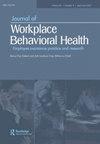新冠肺炎对孟加拉国一线金融服务工作者的心理影响
IF 0.8
Q3 PUBLIC, ENVIRONMENTAL & OCCUPATIONAL HEALTH
引用次数: 6
摘要
摘要新冠肺炎大流行影响了全球数百万人的身体和精神。在资源紧张的国家,在人口稠密的社区和一线工作人员(如医护人员和零售员工)中,由于担心感染这种致命疾病而导致的心理痛苦程度很高,他们在提供服务时没有穿戴适当的个人防护装备。这项研究评估了银行员工的心理困扰程度,他们也是重要的一线员工。采用预先设计的凯斯勒心理困扰量表(K10)问卷,从120名银行员工中收集数据。十分之九的受访者表示,他们可能会经历轻度至重度的心理困扰,86.6%的人觉得自己很容易与快速传播的新冠肺炎病毒携带者密切接触。卡方检验结果表明,已婚员工(36.37对32.16)和分配到银行分行的员工(36.34对33.25)经历心理困扰的可能性分别高于未结婚员工和分配到总部的员工。为了解决这个问题,卫生政策制定者和银行监管机构必须制定针对银行员工的心理健康干预措施、治疗方法和指导方针。本文章由计算机程序翻译,如有差异,请以英文原文为准。
Psychological impact of COVID-19 among frontline financial services workers in Bangladesh
Abstract The COVID-19 pandemic has affected millions of people worldwide both physically and mentally. In resource-strapped countries, high levels of psychological distress caused by fear of getting infected with the deadly disease has been observed in densely populated communities and among frontline workers (e.g., healthcare workers and retail employees), who provide services without wearing the appropriate personal protective equipment. This study assessed the level of psychological distress among bank employees, who are also essential frontline workers. Data were collected from 120 bank employees by using a predesigned survey questionnaire consisting of Kessler Psychological Distress Scale (K10) questions. Nine out of ten respondents indicated that they were likely to experience mild to severe psychological distress, and 86.6% felt vulnerable to having close contact with a carrier of the rapidly spreading COVID-19 virus. The Chi-square test results indicated that married employees (36.37 vs 32.16) and those assigned in bank branches (36.34 vs 33.25) had a higher likelihood of experiencing psychological distress than those who were not married and those assigned in head offices, respectively. To address this issue, health policymakers and bank regulatory authorities must develop mental health interventions, treatments, and guidelines specific for bank employees.
求助全文
通过发布文献求助,成功后即可免费获取论文全文。
去求助
来源期刊

Journal of Workplace Behavioral Health
PUBLIC, ENVIRONMENTAL & OCCUPATIONAL HEALTH-
CiteScore
2.40
自引率
6.70%
发文量
14
期刊介绍:
The Journal of Workplace Behavioral Health, retitled from Employee Assistance Quarterly to better reflect its expanded focus, presents innovative research, applied theory, and practical information to keep workplace human service administrators, counselors, and consultants up to date on the latest developments in the field. This refereed journal is an essential guide to best practice and research issues faced by EAP professionals who deal with work-related and personal issues including workplace and family wellness, employee benefits, and organizational development.
 求助内容:
求助内容: 应助结果提醒方式:
应助结果提醒方式:


